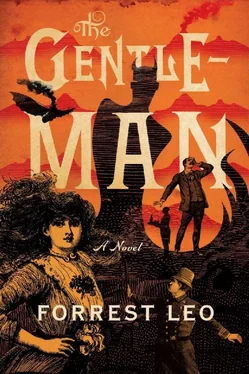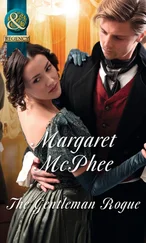‘Life WAS re-STORED—’ No, no, no. The advent of the sun has thrown me off my rhythm. I am a creature of the night. The day is not made for poets. I begin again. ‘The MASQU-er-ADE re-STORED to ME my LIFE: / Re-STORED my MUSE and TOOK a-WAY my WIFE.’
I am chuckling to myself as Simmons enters. This night has improved my disposition as no night has in I do not know how long. I am feeling vastly better. That I contemplated suicide barely twelve hours ago seems to me most strange and wondrous. I feel so well this morning that I could sing. I am exhausted but exhilarated.
‘Good morning, sir,’ says Simmons, setting down a tray of tea. He is accustomed to my erratic hours of old. ‘Did you sleep well?’
‘No, Simmons, I didn’t sleep. I thought it best to take advantage of any wifely reprieve to write. Where was she?’
‘Excuse me, sir?’
‘My wife. I heard her come in just now. The door slammed. Did you find out where she’d been?’
‘That wasn’t your wife, sir,’ says Simmons. ‘That was Miss Elizabeth going out for a morning walk round the park.’*
I am surprised by this news, but cautiously optimistic. ‘Then where is my wife?’ I ask with bated breath.
‘She’s still missing, sir.’
My heart leaps. ‘That’s marvellous! Thank you, Simmons, you’ve taken a load off my mind.’
‘You aren’t worried, sir?’ says he.
‘Worried? No, why on earth should I be? Maybe she has a lover. That would be brilliant! Get her out of the house once in a while, give me some peace. Do you know I wrote all night?’
Simmons looks queer, as if he wants to say something, but he does not. Instead he asks only, ‘Is it good?’
‘What an awful question, Simmons!’ I exclaim, laughing — my heart feels buoyed aloft on butterfly wings. ‘Of course it’s good!’
‘May I read it?’
‘Certainly not,’ I snap. I regret my brusqueness, but Simmons has an unpleasant habit of making my writing seem much worse than it really is. I do not like it when I am composing and feeling grand and then someone comes along and reads my work and finds it wanting. It takes one down so quickly. It is like when one has a dream of flying, and then just as the world below looks its most marvellous and one feels the freest, it suddenly occurs to one that one hasn’t any wings and that humans aren’t built for flight and that the laws of physics decree that one must fall — and then with a sickening sensation one begins to plummet to the earth so far below. That is what I always think of when I feel pleased with my poetry and then Simmons reads it. He is an astute critic, of that there is no doubt — but he is not always a gentle one, and my constitution requires gentleness.
Simmons has that queer look again, and says at length, ‘Do you really think Mrs Savage has a paramour, sir?’ It is an indelicate question, and asking it is unlike him.
‘Well, how else do you explain it?’ I counter. ‘Lovely though it would be, wives don’t just disappear. It is strange, though — devilish strange. Or “dev’lish,” if you will. I’ve decided it is only one syllable, by the way. Dev’l.’
‘Very good, sir,’ he says, and leaves the room to continue his duties. He asks no questions and pushes the subject no further. Damned good man, Simmons.
I am struck by a poetic feeling, and extemporise: ‘’Tis DEV’lish STRANGE when WIVES just DIS-a-PPEAR.’ I like it. It has some panache. I wonder if there is something in it — a story in blank verse about disappearing wives, some devilry, a dash of the supernatural. It would not be the epic of which I have spoken — but in later years it could perhaps be viewed as a sketch of it, an early consideration of wives, the Devil, heartbreak, the follies of youth, perhaps abductions—
Very abruptly, something quite awful occurs to me.
‘SIMMONS!’ I cry.
He enters with his usual promptness. ‘Sir?’
I cannot say it. It is too terrible. Simmons will never forgive me. ‘Nothing. Nothing, Simmons. Never mind. Please let me know if my wife comes back. That will be all.’
‘Very good, sir,’ he says, looking perplexed. He leaves again.
My stomach is doing all sorts of peculiar things — whether from fear, excitement, guilt, or hunger, it is impossible to tell. I try to consider the situation, but I am too disturbed to think straight. Before I can order my thoughts the door slams again. I wonder if it is Vivien, and my stomach does even more strange things.
It is not Vivien; it is Lizzie. She skips into my study, holding a rather crushed baked good which she deposits on my desk and a sheaf of papers which she does not. Vivien is still missing. The unspeakable consideration still stands.
Lizzie says, ‘Good morning, you look like death, I brought you a pastry, and we need to talk.’
I can see that she’s in a lecturing mood, so I tell her that I’m a bit preoccupied this morning, which I am. I cannot focus my thoughts. They are swirling and purling through the whirling world without pause or consideration for my delicate sensibility just like my sister.
‘You lied to me,’ she says.
‘What are you talking about?’ I demand. I do not lie. I do, however, sometimes omit the truth. I wonder to which particular truth she may be referring.
‘You said you couldn’t write.’
‘I can’t!’ I cry. I do not want to think about what I wrote last night; it already seems lacking. The light of day is a most awful thing.
She waves the papers she’s holding at me. ‘Then what are these? I found them in my room, locked in my desk!’ Her voice is abruptly tender. ‘You could have told me, Nellie. I’m so proud of you. I read them while I walked this morning — I believe they’re the best you’ve ever done.’
I do not recognise the papers. What is she talking about? I need her to leave. I need to think. Strange things are happening. Have happened. I need a moment alone. ‘They’re not mine,’ I tell her.
‘Don’t be silly, whose else would they be?’
Whose what ? I have no idea what she is talking about. I have not been attending. I am not myself. I am distracted. I ask to look at them. She hands me the papers. More unpleasant things happens in my abdomen. They are poems. They’re in Vivien’s handwriting. I tell her so.
‘Surely she transcribed for you?’ enquires my ever-loyal sister. I feel an overwhelming sense of goodwill toward her, which is in turn immediately overwhelmed by my sense of wretchedness. I have not time to peruse them at length, but the words I see are quite good. Perhaps better than good. Oddly arranged, but good.*
‘I haven’t written anything since we got married.’
‘Then whose are they?’ asks Lizzie. ‘Is she copying out Tennyson?’ I am appalled that Lizzie could even ask the question. What have they been teaching her at that school? If it is the sort of place which takes perfectly sensible girls and renders them unable to tell whether or not a scrap of verse is written by Tennyson, then perhaps it is better she was expelled.
‘This isn’t Tennyson,’ I tell her icily.
‘Browning?’
For God’s sake. ‘No.’
‘Either of the Rossettis?’
It is self-evidently neither of the Rossettis. Lizzie is growing stupider. ‘SIMMONS!’ I yell.
‘Sir?’ he says, entering promptly. I believe he does listen at my door. It does not bother me, but I note it. He is still the best butler in Britain, and a damned good judge of poetry besides.* He will provide answers.
Without a word I hand him the poems. He peruses them briefly, then makes his pronouncement.
‘They’re charming, sir, if not what you might call structurally sound.’ I knew that already . He is not giving me the answers I need.
Читать дальше












